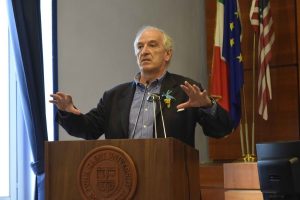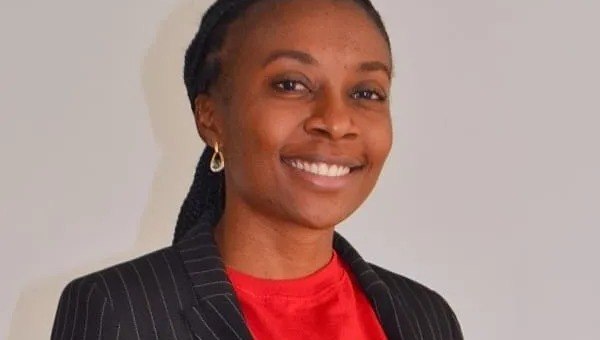Will the EU Hold Together? The Challenge of Sovereignism
by Nastassja Biles
On June 6th, 2017 the Guarini Institute for Public Affairs hosted a round table discussion called “Will the EU Hold Together? The Challenge of ‘Sovereignism.” The distinguished speakers for this event were Stefano Bottoni, Mykola Riabchuk, and György Schöpflin. Stefano Bottoni is a Senior Research Fellow at the Institute of History of the Hungarian Academy of Sciences. György Schöpflin is a Member of the European Parliament (MEP) from Hungary. Mykola Riabchuk is a Senior Research Fellow in the Ethnopolitics Department of the National Academy of Sciences of Ukraine.

Professor Federigo Argentieri
The event began with Guarini Institute Director and moderator Federigo Argentieri commenting on the fact that the European Union has never in its history been at risk like it is now with situations like Brexit, the war in Ukraine and the rise of anti-EU parties all over the continent. He gave examples such as Marine Le Pen’s National Front, the Alternative for Germany party as well as Italy’s Northern League and Five Star Movement.
The Director then handed the floor over to György Schöpflin who said that he considers Brexit a bad idea for both Great Britain and the EU. According to Schöpflin, England felt that it had lost control over its own politics and that Brexit is an attempt to regain that control. Additionally, he stated that politicians in London tended to blame Brussels for all of their problems, which helped fuel an anti-EU sentiment. However, it was not so much Brussels that controlled London, but rather a culturally and intellectually rich London that controlled a culturally and intellectually impoverished Britain. Schöpflin also brought up the issue of what will happen to EU citizens living in Britain and vice versa regarding their right to stay. Finally, he stated that English nationalism is based mostly on a feeling of not being European, which helped further the divisions between those who were pro and anti Brexit.
Then Mykola Riabchuk began talking about the issue of the EU as related to Ukraine. He started off by stating that Ukraine is the only country where the revolution happened under the EU flag. Riabchuk said that there are no longer free and fair elections and that Ukraine is going the way of Russia and Belarus meaning that there is no European future for Ukraine, which sparked protests in the country. However, it is because of all the revolutions that Ukrainians have a very strong civil society today. He then went on to make a point of a general trend he saw in the world with a correlation between majority Catholic or Protestant nations and successful states, Orthodox nations with average working states, and Islam correlated with failed states. Riabchuk also states that ethnically homogeneous states tend to be more successful.
Finally, the third speaker Stefano Bottoni talked about his shock at the news that the Central European University of Budapest was being targeted specifically with the regulation of certain universities in a new law that states that all university campuses must also have a campus in their home state. In the case of CEU of Budapest, although it is an American university, it only has a campus in Hungary. He believed that CEU is being targeted because it is an English-language university that is accredited in the US. According to others, this law is attempting to shut down democratic institutions such as CEU, which teaches courses on politics. He also talked about the Jobbik party in Hungary, which is considered racist and anti-Roma, yet will probably transform to suit any popular anti-establishment views at the time of elections. In conclusion, he stated that the reason that CEU was being attacked was the lack of new waves of immigration, meaning that there was a new “enemy” that needed to be tackled during the election campaign.





